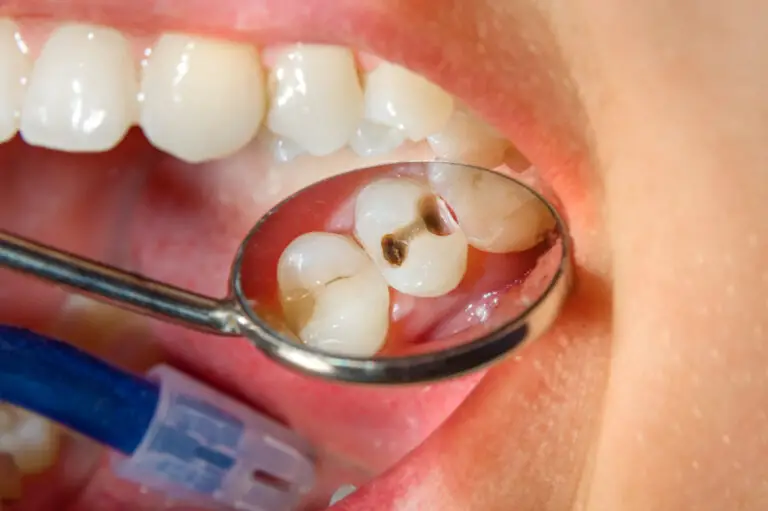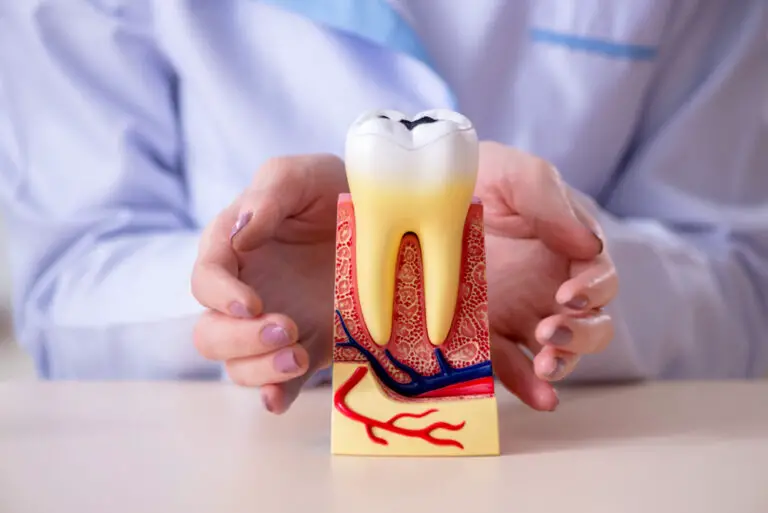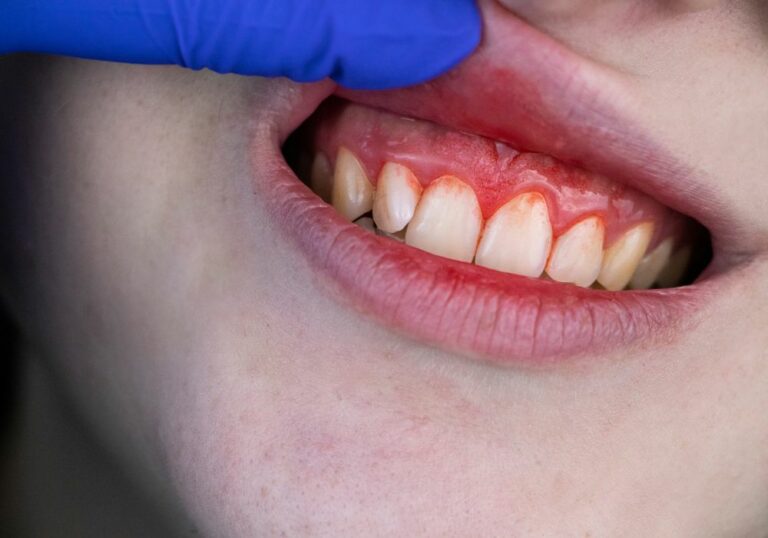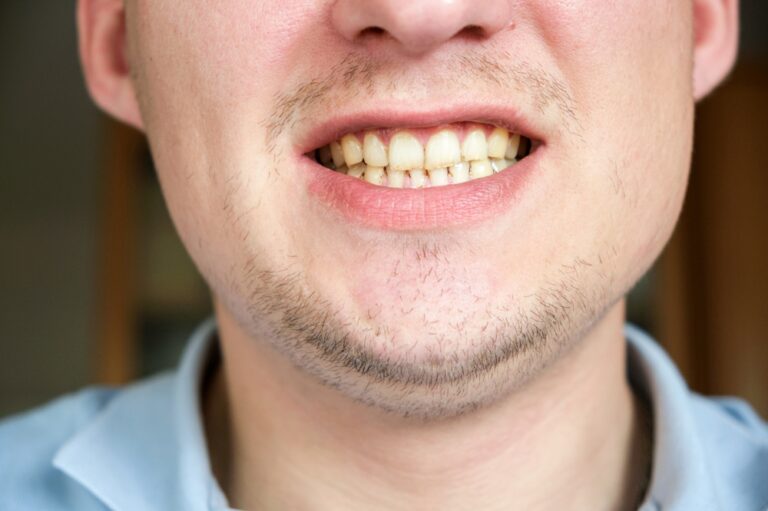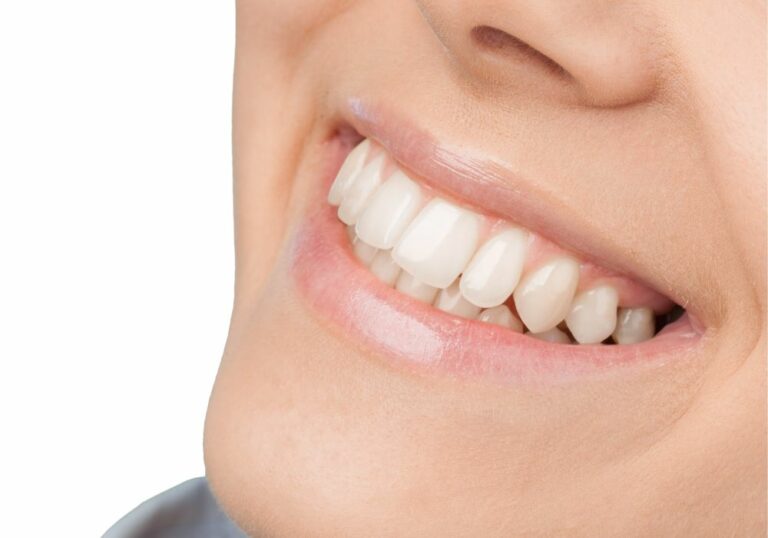Stress and anxiety are increasingly prevalent in modern life. While stress is a normal part of life and can even be beneficial in small doses, chronic and excessive stress levels can negatively impact physical and mental health.
One connection that research is exploring is the effects of prolonged stress and anxiety on gum health. Could elevated stress hormones and chronic anxiety contribute to gum problems like swelling, tenderness and bleeding? Let’s analyze the possible mechanisms underlying this relationship.
How Stress Affects The Body

The body is equipped to handle small doses of stress thanks to the built-in fight-or-flight response. When you face a threat, real or perceived, your nervous system sounds an alarm bell by releasing stress hormones like adrenaline and cortisol.
These hormones cause physiological changes to prepare you to confront the threat or flee to safety. Your breathing and heart rate increase, blood pressure rises, senses become sharper, and energy supplies are directed to the muscles.
This stress response is vital for your survival when facing immediate danger. However, persistent and unrelenting stress keeps your body in a constant state of high alert. Chronic activation of the body’s stress responses can lead to wear and tear on multiple systems over time:
Effects of Chronic Stress:
- Suppresses the immune system – prolonged high cortisol weakens your immune cells’ ability to respond to pathogens. This makes you more susceptible to infections.
- Elevates inflammation – stress triggers increased levels of inflammatory markers like C-reactive protein. Chronic inflammation damages tissues and organs.
- Disrupts digestion – stress diverts blood away from the digestive system. It can cause issues like acid reflux, constipation, diarrhea.
- Impacts mood – sustained stress contributes to depression, anxiety, irritability, and other mental health problems.
- Interferes with sleep cycles – excess cortisol and adrenaline make it hard to fall and stay asleep. Lack of sleep further stresses the body.
- Causes hormonal imbalances – cortisol interacts with insulin, thyroid and sex hormones. This can disturb menstrual cycles, glucose regulation, metabolism and more.
- Weakens the cardiovascular system – chronic stress induces elevated heart rate and blood pressure. This causes wear and tear on blood vessels and the heart muscle over time.
- Hurts cognitive processes – excess cortisol can hamper memory, decision making, concentration and problem-solving skills.
Clearly, persistent stress and the sustained activation of stress responses have detrimental effects throughout the body and mind. Understanding these widespread impacts sets the stage for analyzing how chronic stress can potentially affect oral health and gum tissues as well.
The Mouth-Body Connection
There is abundant scientific evidence for a two-way relationship between oral health and overall physical health. The condition of your mouth can affect the rest of your body and vice-versa. This oral-systemic linkage exists because:
- The mouth contains over 700 types of bacteria, some helpful and others harmful. An imbalance in the microbial environment can spread infection to other parts of the body.
- Inflammation in the gums caused by bacteria releases cytokines into the bloodstream. These inflammatory immune proteins drive inflammation in other areas of the body like the heart and joints.
- Poor oral hygiene leads to more plaque buildup on teeth, allowing plaque bacteria to enter the bloodstream and potentially travel to major organs.
- Pre-existing conditions like diabetes and heart disease have inflammatory effects that can exacerbate gum problems.
- Certain medications cause dry mouth or overgrowth of harmful oral bacteria as side effects. This alters the microbial balance.
With this close interdependence between oral and overall health in mind, it’s plausible that chronic stress may contribute to gum problems by exploiting the mouth-body connection. Let’s explore some ways this could occur.
How Stress May Negatively Impact Gum Health

Researchers are still teasing apart the exact mechanisms, but multiple studies suggest stress affects gum health in some of the following ways:
1. Stress Impairs Oral Hygiene Habits
Good oral care requires you to actively invest time and effort in brushing, flossing, using mouthwash, and getting dental cleanings. But high stress levels often lead to diminished self-care and poor hygiene habits.
People dealing with excessive anxiety, depression or pressure may find it difficult to adhere to regular and effective brushing and flossing. Infrequent or inadequate oral hygiene allows more plaque – a sticky film of bacteria on the teeth – to accumulate on the gums and between teeth.
Too much plaque growth irritates the gum tissue, causing inflammation, swelling and bleeding. This can allow bacteria to gain access deeper into gum tissues, leading to more serious infections.
2. Stress Weakens The Immune System
As described earlier, sustained high cortisol due to chronic stress suppresses the body’s immune responses. This stress-induced immune impairment could plausibly make the gums more vulnerable to bacterial infections.
Bacteria can breach the epithelium – the protective outer barrier of the gums – more easily when immunity is lowered. Oral bacteria like Porphyromonas gingivalis and Tannerella forsythia can then infiltrate the gum tissues and provoke further inflammation and damage.
3. Stress Exacerbates Inflammation
Chronic stress systemically raises inflammatory signals like C-reactive protein and pro-inflammatory cytokines. This creates a constant state of low-grade inflammation throughout the body.
Elevated inflammation is closely tied to gum disease progression. It can destroy the supporting structures of the teeth – the gingiva, periodontal ligament and alveolar bone.
The combination of excess bacteria and amplified inflammatory responses due to stress may act synergistically to break down gum tissues.
4. Stress Can Increase Teeth Clenching and Grinding
Many people report increased teeth grinding or clenching when they feel tense and anxious. This puts abnormally high levels of pressure on the chewing muscles and wears down tooth enamel. Clenching and grinding can also injure and inflame the gum tissue around teeth.
Over time, this chronic trauma to the gums allows bacteria easier access for more severe infections like periodontitis. The pressure may even loosen teeth in their sockets.
5. Stress Reduces Saliva Flow
Being stressed or anxious often dries out the mouth, as it inhibits saliva production. Saliva acts like a cleansing solution in the mouth. It washes away food debris, neutralizes damaging acids, and contains compounds that fight microbes.
Reduced saliva due to stress enables cavity-causing bacteria to multiply faster. It also increases risk of yeast infections like oral thrush. Insufficient saliva and dry mouth complaints are common in people with chronic anxiety.
While more clinical studies in humans are required, these potential mechanisms demonstrate how prolonged stress could plausibly contribute to gum disease progression. Now let’s examine some of the scientific evidence gathered so far.
Studies Investigating Links Between Stress and Gum Disease

A number of observational studies have found associations between psychological stress, anxiety, and gum disease:
- A 2010 study published in the Journal of Periodontology showed that dental students had a higher incidence of gingivitis during exam periods compared to after exams. Stress levels were evaluated using salivary cortisol samples.
- A 2011 study in Acta Odontologica Scandinavica found that patients with anxiety disorders had a 59% higher odds ratio of being diagnosed with periodontitis.
- A 2013 paper in BMC Oral Health reviewed evidence from studies until then investigating stress as a risk factor for periodontal disease. The analysis concluded that stress and depression are implicated as risk factors, but called for longitudinal trials.
- A 2019 cross-sectional study published in the Journal of Clinical Periodontology observed that patients with periodontitis had higher perceived stress scale scores compared to periodontally healthy subjects. They also had elevated markers of psychological distress.
However, there are some conflicting studies that did not find connections between psychological factors and gum disease. So there is still debate, and higher quality longitudinal studies are required. But many dental professionals agree there seems to be an association between chronic stress and periodontal infections.
Animal studies also offer some early clues on mechanisms:
- Research in rats showed that immobilization stress increased gum inflammation and bone loss. The effects were linked to elevated corticosterone levels.
- A study in mice found more extensive periodontal damage in chronically stressed animals compared to non-stressed controls after introducing an oral bacterial infection.
Overall the current evidence suggests stress, anxiety and other psychological influences can exacerbate gum disease, but may not directly cause it without the presence of bacterial plaque. More human studies documenting progression are needed. But it’s plausible that stress contributes to gum infections indirectly by the mechanisms described earlier.
Signs Of Gum Problems Related To Stress
Look out for any of the following signs and symptoms indicating your oral health may be suffering due to high stress levels and anxiety:
- Swollen, red, or tender gums
- Gums that bleed easily with brushing and flossing
- Puffy, enlarged gums
- Gums that have pulled away from the teeth
- Exposed tooth roots due to receding gums
- Persistent bad breath
- Loose or shifting teeth
- Tooth sensitivity and pain while eating hot or cold foods
- Mouth sores that won’t heal -Changes in bite alignment
See your dentist promptly if you notice any sore, inflamed gums or other symptoms. Red swollen gums that tend to bleed are usually indicative of gingivitis – early stage gum inflammation caused by plaque buildup.
Your dentist can perform a comprehensive exam and use x-rays, pocket depth measurements and other tests to diagnose the exact cause and severity of gum problems. Advanced diagnostic tools like microbiome tests help identify any imbalance between good and bad oral bacteria.
Don’t ignore these warning signs, as swollen, painful gums can worsen into periodontitis – infection of the tissues and bone supporting the teeth – without proper treatment. Tell your dentist about any stress issues you are facing.
What You Can Do to Prevent Stress-Related Gum Damage

The mouth-body association means looking after physical as well as mental health is key for optimal oral well-being. Here are some self-care tips for keeping your gums healthy:
Practice Stress Management Techniques
Try meditation, yoga, deep breathing exercises, spending time outdoors, or engaging hobbies to mitigate daily stressors. Keeping cortisol and inflammation in check benefits overall health, including possibly gum health.
Adopt Healthy Coping Strategies
Instead of unhealthy coping methods like smoking, alcohol abuse or emotional eating, build resilience through exercise, social connection, sufficient sleep and a balanced diet. Get help from a counselor if needed.
See Your Dentist Regularly
Get professional cleanings every 6 months and routine oral exams to monitor your gum health. Early intervention can halt progression of any stress-related gum issues. Inform your dentist about unusual symptoms.
Don’t Neglect Oral Hygiene
Be meticulous about daily brushing and flossing, especially when stressed. Use antimicrobial mouthwashes. Poor hygiene allows plaque bacteria – the catalyst for gum disease – to thrive.
Monitor for Damage from Clenching/Grinding
If you notice symptoms like tooth sensitivity or worn enamel, ask your dentist about night guards. These protect teeth from stress-induced clenching or bruxism damage. Address the underlying stress as well.
Improve Diet Quality
Eat a balanced diet rich in fruits, vegetables, lean proteins, probiotics and omega-3s. Nutrients like vitamin C support gum tissue regeneration and immune function.
Quit Smoking
Smoking worsens gum disease. Its effects on oral bacteria and inflammation make quitting critical for gum health, especially if you have periodontitis.
While self-care helps protect your gums, severe or advanced cases of gum disease like periodontitis may need professional treatment. This could involve deep cleanings, antibiotics, laser therapy or gum surgery.
A customized treatment plan tailored to your specific gum health status provides the best chance of arresting progression. Controlling anxiety where possible reduces risk factors.
The Bottom Line
While anxiety alone may not directly induce gum infections, chronic stress can plausibly enable and exacerbate periodontal issues through several indirect mechanisms.
The combination of prolonged high cortisol levels, diminished immunity, systemic inflammation, poor oral hygiene and unhealthy habits creates the perfect storm for gum disease to develop and worsen.
Take steps to lower stress and get regular dental exams and cleanings. Seeing your dentist promptly if you notice any gum swelling or tenderness allows early intervention before lasting damage occurs. A holistic approach addressing both physical and mental health provides optimal protection for your gums.
Frequently Asked Questions
Here are answers to some common questions about the relationship between anxiety, stress and gum health:
Q: Can anxiety by itself directly cause gum disease?
A: It’s unlikely anxiety alone can directly induce gum disease without the presence of bacterial plaque. However, chronic anxiety can contribute to gum infections indirectly by leading to detrimental oral health habits, immune impairment, and increased inflammation.
Q: If I keep my stress levels in check, does that fully prevent gum problems?
A: Not necessarily. Well-managed stress and robust coping skills certainly support gum health, but other factors like nutrition, genetics and oral hygiene play a role too. You still need regular dental cleanings and checkups to monitor for early signs of any gum issues.
Q: Why do my gums bleed a lot when I’m extremely anxious or stressed?
A: Stress decreases immunity and raises inflammation, making gums more vulnerable to bacteria and plaque irritation. Clenching or grinding due to stress also injures the gum tissue. See your dentist to identify the cause, and be meticulous about oral hygiene if you have bleeding gums.
Q: Can gum disease increase feelings of stress and anxiety too?
A: Yes, likely so. The bidirectional relationship means gum infections can exacerbate anxiety through pain and discomfort. Knowing gum problems resulted from poor hygiene due to stress can fuel those emotions. It can become a self-perpetuating cycle.
Q: Is it possible for gum disease to be totally psychological in origin?
A: Unlikely, since plaque bacteria initiate damage to gum tissues through direct infection. However, psychological aspects like stress alter behaviors and biological processes in ways that enable bacteria to infect more extensively. Your mental state absolutely impacts susceptibility and severity.
In summary, while more human research is warranted, managing stress and anxiety is beneficial for both your overall wellbeing and gum health. But maintaining diligent oral hygiene and getting regular dental cleanings are essential too. See your dentist promptly if you notice any unusual gum symptoms.

